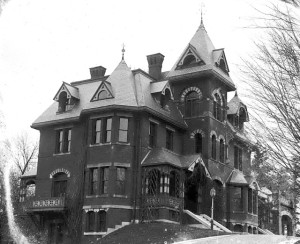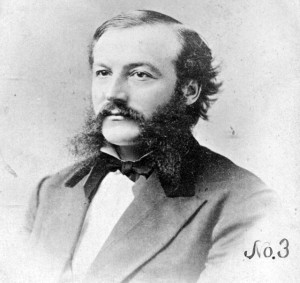True Tales: A Joy Forever
By George T. ComeauThere could be no more a prominent citizen than Congressman Elijah Adams Morse, and when he died in 1898, the entire community wept at the loss of this lion of a man.
All factories, stores and places of business suspended operations and closed their doors during the services, and representatives of all classes of society, together with officials high in state and national affairs, gathered to attest to the universal esteem, regard and love in which Elijah Morse was held at home and abroad. So great was the gathering that the numbers were unable to enter the church and remained outside to follow the casket to his grave at Canton Corner. Morse was not born here in Canton, but his largess and contributions to civic and private life are still felt today more than 100 years after his death.
Morse’s father, Abner, was one of the best-known genealogists and theologians of his time. Born in Medway in 1793, Abner Morse was the family historian. Morse traced his lineage in America to seven settlers, and at the time of the printing of his book in 1850, “The Memorial of Morses,” there were more than 10,000 descendants of Morses in the United States. This is the same family to which we owe thanks for the invention of the telegraph and stock ticker. The original descendant in America was Samuel Morse, who settled in Dedham in 1634.
Abner Morse graduated from Brown University and spent two years studying theology at Andover and was ordained a Congregational minister in Nantucket in 1819. Morse’s work as a minister placed him in South Bend, Indiana, from 1835 to 1842. It was there, with his second wife, that he had three boys: Abner, Elijah, and Albert.
At the point at which Abner returned to New England with his sons and wife, he was fairly poor. They chose Sharon as their home, and young Elijah acquired his education at the Boylston School in Boston. At 15, during a summer recess, Elijah began peddling door to door a stove polish that was developed from a formula given to him by Dr. Charles Jackson. Jackson was a close and intimate friend of Abner Morse Sr., and the gift of the formula would forever change Elijah’s life.
Jackson was quite prominent in his own right and was the brother-in-law of Ralph Waldo Emerson. Jackson is particularly remembered for his involvement in a series of bitter conflicts that left their marks on the scientific and social scenes of his day. They followed a standard pattern: someone would announce a discovery, Jackson would then claim prior discovery, and a controversy would ensue. The conflicts over discovery were contentious and downright nasty. Jackson claimed prior discovery of Morse’s telegraph, the digestive action of the stomach discovered by William Beaumont, and Morton’s discovery of the anesthetic effects of ether. Late in his life, Jackson was committed to the McLean Asylum and died in 1880.
Yet the larger than life Jackson likely enthralled the young Elijah Morse, and the formula for the stove polish was a hit. The small cakes of polish were peddled in a carpetbag, and sales were brisk enough for Elijah to open a small factory in Sharon in 1860. Within a year, however, Morse answered Lincoln’s call for 75,000 volunteers. Morse headed for Virginia and was enlisted in Company A, Fourth Regiment Massachusetts Volunteers. Morse stayed in the war, engaging in several notable battles, ending his service in 1864. Returning home to Canton, he rented a small room quite near Canton Center and began making stove polish.
Working alongside his brother Albert, for four years they began to lay the groundwork for an international company of epic proportions. Morse Bros. would become a household name across the globe, and the profits would become unimaginable. The product was called Rising Sun Stove Polish.
The stove that we know today is a far cry from the stoves of the mid to late 19th century. By the 1850s, the “modern kitchen” was equipped with a cast iron cooking range, and this was a fixture in just about every middle-class home. Cast iron can rust, and keeping the fixture polished was accomplished with “blacking.” Morse’s formula was not necessarily unique; it was, however, incredibly well advertised. What Morse excelled at, above all other traits, was the sales pitch.
Advertising was not a new medium in the time of Morse, but with the advent of chromolithographic printing, the use of trade cards advanced products in a whole new way. Morse led the efforts at creating some of the best and most highly sought-after advertising. And every great product needs a tagline, and here the line that sold millions of bars of polish was borrowed from a Keats poem: “A thing of beauty is a joy forever.” Morse became the first person to employ outdoor advertising when he purportedly had his logo painted on the rocks of Camden Harbor.
Through the use of small paper picture cards, Morse was able to build a common household product into a multi-million-dollar industry. In one single day alone in 1881, Morse’s factory sent 2,270 cases weighing 29 tons out in four freight cars from Canton Junction. On that single day, 165,000 four-inch long bars left Canton and would measure more than ten miles if laid end to end. There was gold inside the small orange wrappers.
There are four little books on the shelf in the Canton Historical Society; they are the formula books for Rising Sun. The product was deceptively simple — water, Plumbago (graphite) from Ceylon, Carbon Black, and hard soap. In 1883, the daily production was five tons, and demand grew exponentially. There was not a store in America that did not carry his product.

The grand mansion built by Elijah Morse, present site of Canton High School (Courtesy of the Canton Historical Society)
From this enormous wealth, Morse built the factory on Washington Street and employed hundreds. Morse built an enormous mansion where Canton High School now stands, and erected a windmill and observatory to survey his factory and the town beyond. When Morse was at his estate, an enormous American flag would be flown to signify that the occupant was in residence. And that house was simply a site to behold. In front of his residence were two gilded statues: Spring and Autumn. On the top of the roof he had a life-size figure of Justice holding the scales evenly poised.
In politics Morse was a strong Republican. He was elected a member of the state legislature in 1876. In 1886 and 1887 he served as a member of the state senate, and in the following year he was in the governor’s council. In 1888 he was elected to Congress and served in the 51st, 52nd, 53rd, and 54th congresses, declining to be a candidate for re-election on account of his health in 1896.
In local affairs, he was a zealous and active prohibitionist of alcohol and tobacco. His rants against both are legendary. When a New York firm offered to donate tobacco to Canton factory workers, Morse responded, “We don’t use tobacco. Consider it a vile, dangerous, poisonous narcotic. It will kill lice, fleas, and every creature on God’s footstool but a tobacco-worm, and will poison, injure, and shorten the life of any man that uses it. It is the twin sister and handmaid of strong drink …”
Morse was a leader in town improvements, and he served as a member of the committee that prevailed upon the Boston & Providence Railroad to erect the present station at Canton Junction in place of the old timber shed, which formerly served the public at that point. Morse also built and maintained at his own expense the first public watering trough on the town highway and was ever active and liberal in public charities and donations. As a manufacturer he was liberal toward his help, paying weekly wages long before the practice became law. And when business depression compelled shutdowns, Morse extended privileges in way of half pay and reductions in rent to help his men bear the financial burden. Memorial Hall was built on land he donated, and he was instrumental in making sure that it would forever hold true the memory of those who died in the Civil War.
Morse became sick in 1896, and for two years he fought his illness. Eleven days after his 57th birthday, Morse died at his estate in Canton. The newspaper headline of June 10, 1898, simply read “Universal Grief.” The story ran across the front pages: “In the past few years Canton has lost many of its prominent citizens. None however have dropped so suddenly from a leading position in the town to the narrow confines of the grave as he whom we laid to rest Wednesday last.”
And on that Wednesday — a typical June day, warm and bright — the entire town closed down to pay tribute and bury Congressman Elijah Morse. At 10 a.m., citizens began to arrive at Memorial Hall, where the body lay in state, to take a last look at the well-known face. The casket was placed in front of the center stage on the second floor in the large hall. Filled with graceful waving palms and beautiful floral pieces, a floral American flag was placed immediately behind the casket.
A detail from the GAR’s Revere Post performed the guard duty. From the time the doors were opened there was a continuous procession entering at the south door and passing around the hall, leaving from the north door. It was noted, “It was peculiarly appropriate that this farewell should take place in the hall that was erected so largely through his efforts and to whose construction and beautifying he had given so much and taken so great pride.”
Elijah Morse’s contributions are still evident today. We can thank him for the property of the Town Hall, the high school, and his family’s donation of land and money to the Massachusetts Audubon Society and sanctuary on Washington Street. This was a self-made man with an enormous fortune who built an empire in his own front yard.
Short URL: https://www.thecantoncitizen.com/?p=27835











